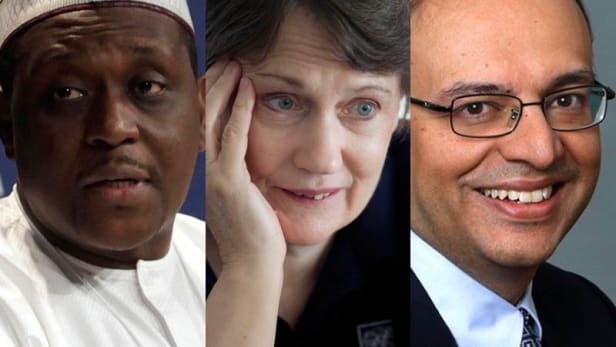By Michael Igoe
Early next week the Global Fund to Fight AIDS, Tuberculosis and Malaria’s board of directors will select a new executive director.
Last week, the board announced three finalists vying to lead the Swiss organization, which distributes roughly $4.5 billion each year to country-led programs combatting the three infectious diseases. The finalists are Dr. Muhammad Ali Pate, a former health minister of Nigeria; Subhanu Saxena, the former chief executive of Indian pharmaceutical company Cipla; and Helen Clark, administrator of the United Nations Development Programme and former New Zealand prime minister.
Devex spoke to several well-placed global health and development leaders about their impressions of the finalists. All of them spoke on the condition that their comments not be attributed by name. Each expressed mixed feelings and some disappointment that the selection process had not generated candidates known for visionary global health leadership.
“I’m not wildly enthusiastic about the shortlist,” said one leader of a major global health organization who has worked closely with the Global Fund and was surprised by the unfamiliarity of the finalists. “I don’t know them personally, which is a little bit different for me,” the health leader said.
Mark Dybul, the Global Fund’s current executive director, was previously known in global health circles for running the U.S. President’s Emergency Plan for AIDS Relief — the largest bilateral health initiative in history — which he also helped create. After four years on the job, Dybul will step down when his term ends May 31.
Of the three candidates vying to succeed Dybul, Helen Clark — who campaigned unsuccessfully to be the U.N. secretary-general last year — is the most familiar to global development leaders. But some of them wondered whether Clark’s leadership at UNDP displayed the creativity necessary to move the Global Fund forward at a time when global health finance is fundamentally changing.
Many developed country donors are questioning their engagement in multilateral organizations, while developing countries continue to play a larger role both in financing and planning the execution of their health and development priorities.
“I think the executive director of the Global Fund has to be hungry,” said the health organization leader. “Something about [Clark] being a candidate feels entitled, rather than deserving, which is really bothersome.”
Nonetheless, some observers believe the board’s list of finalists clears the way for Clark’s eventual selection.
“Given [Dr. Pate’s] criticism of the U.S. president on social media and [Saxena’s] conflict of interest with the pharmaceutical industry, it looks as if the committee was trying to stack the deck in favor of Helen Clark,” wrote the leader of a second major global development organization in an email to Devex.
The same person expressed concern that the “lack of a U.S. candidate on the shortlist risks reducing U.S. engagement.” The U.S. is the largest donor to the Global Fund, contributing nearly one-third of the fund’s total budget.
However, the development leader added that Dr. Pate would be an encouraging choice.
“He is very capable. It would send a positive signal to have an African at the head of the fund given most of its work is in Africa. Plus, since Dr. Pate has spent much of his academic and professional life in the U.S., he is a natural bridge between North and South.”
A developing country representative to the United Nations expressed hope that the board will choose someone who is willing to take risks and challenge some of the orthodoxy — and vested interests — that have emerged around tackling infectious diseases in developing countries. The representative asked, for example, whether a Global Fund leader might question whether bed nets and drugs — as opposed to mosquito control — is the best approach to eradicating malaria in parts of the world where it still kills half a million people every year.
“We need someone who is politically strong, self-confident, unbeholden to these institutional behaviors,” the representative said.


No comments:
Post a Comment